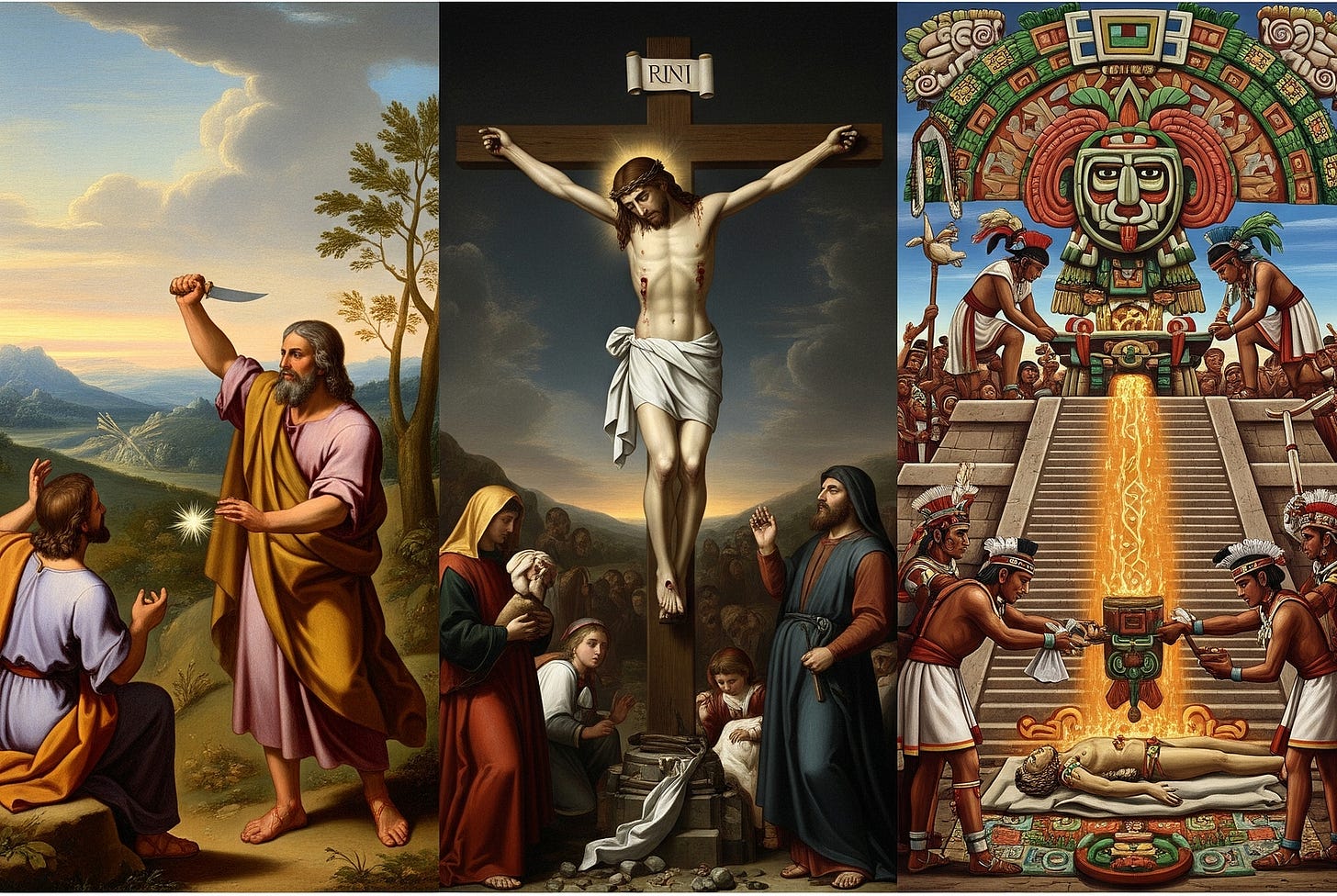Sacrificing Your Son, Your People, or Yourself
Reviewing Carl Jung's Psychology of the Unconscious Mind, Part 5: Tackling Jordan Peterson's Reading List
Carl Jung’s Psychology of the Unconscious is not something I can summarize in a short essay, so I decided to create bite-sized chunks of what I’m getting from it.
Whether it is Abraham sacrificing his son Isaac, the Aztecs sacrificing (in reality) their own people, or Christ sacrificing himself, this idea of sacrifice has been wrestled with for thousands of years.
Jung discusses it at length in Psychology of the Unconscious with its own chapter. This quote stood out to me and helps to link what Jung is thinking to what Dr. Peterson often describes when discussing sacrifice.
“The comparison of the Mithraic and the Christian sacrifice plainly shows wherein lies the superiority of the Christian symbol; it is the frank admission that not only are the lower wishes to be sacrificed, but the whole personality. The Christian symbol demands complete devotion; it compels a veritable self-sacrifice to a higher purpose, while the Sacrificial Mithriacum, remaining fixed on a primitive symbolic stage, is contented with an animal sacrifice. The religious effect of these symbols must be considered as an orientation of the unconscious by means of imitation.” — pg. 478–479 [Emphasis mine]
One reason this quote stood out to me is because it brings several important themes together:
the contents of the unconscious mind
its link to religion
the universalism of sacrifice and its mythological development
the need for imitation by humanity.
All of this comes together to explain that the unconscious mind is trying to orient us towards the ultimate goal, which is a posture towards the world that requires not just understanding, but action. That action is expressed ultimately in the story of Christ as voluntary self-sacrifice for the benefit of other humans.
This is the orientation, the mind-set, or the posture with which our unconscious mind directs us to take. This is the ultimate cure for the neuroticism, anxiety, listlessness and malaise felt by modern man. We developed the ability for a special type of advanced consciousness that allows for self-recognition, self observation, or introspection. That introspection creates some distance between our minds and our physical reality as observers of ourselves and others. The distance creates the unknown and the unknown creates anxiety.
To quell that anxiety, we need direction. We need a target. And that target properly placed is voluntary self-sacrifice to the benefit of other humans. How we define “benefit” and which humans we choose is a second order problem but at least that concept points us in the right direction. History has shown us that the most dangerous humans are oriented towards what they believe is the benefit of humanity and often choose only certain humans.
But what is sacrifice? Why did God tell Abraham to kill his own son and why did Christ allow himself to be killed? Why is the Christian symbol a man being murdered in the most painful and humiliating way possible? Why did the Aztecs do it?
To sacrifice is to delay gratification now in order to fulfill a greater purpose in the future. You are right now sacrificing whatever else you could be doing in order to read this sentence because you put whatever else in a value hierarchy below what you are getting from whatever you are doing in this moment. Our whole lives are like that. We could be doing enumerable other things at any moment but we sacrifice those things to whatever we are doing right now and whatever we choose is putting everything else below it. Those other opportunities are sacrificed to what we choose instead to do now.
The greater the sacrifice, the greater the benefit. That is why Cain’s countenance fell while Abel did well. Different levels of sacrifice. That is why God told Abraham to sacrifice his son: what greater sacrifice and what greater benefit? Well, Christ upped that game by sacrificing his entire being: the Father and the Son.
When Jung states that “The religious effect of these symbols must be considered as an orientation of the unconscious by means of imitation”, this concept is what he is referring to. Our unconscious mind producing concepts that we then describe and create stories to explain through language and writing. Those stories throughout thousands of years have been ever sharpened into more and more exacting stories and personalities for us to imitate.
The Christian symbol of Christ on the cross is a daily reminder for Christians that the ultimate personality to adopt is that of constant, voluntary self-sacrifice to serve others.



